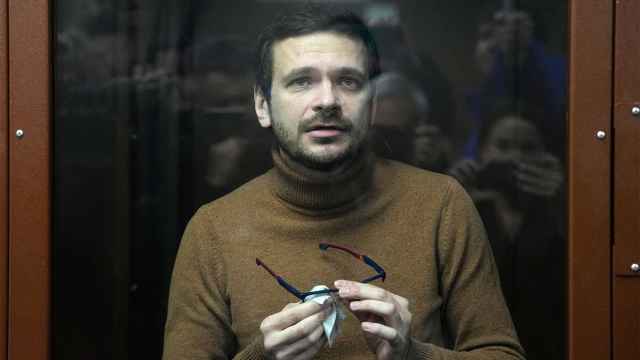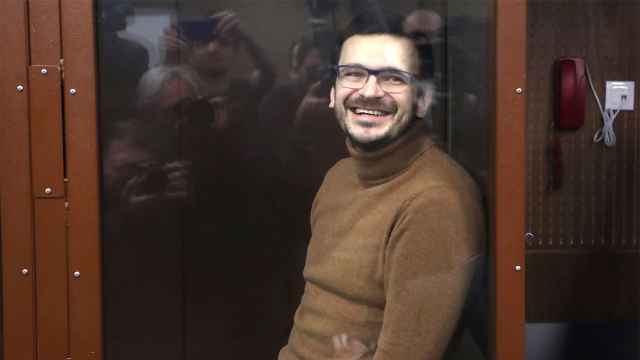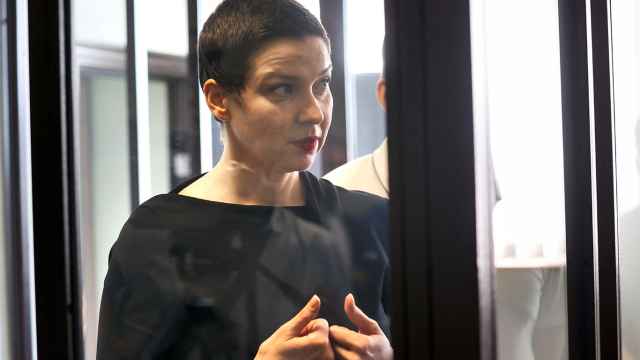On November 17, a major protest demonstration of the Russian opposition in exile took place in Berlin. Some of the participants carried Russian flags, not the white and blue triband used by some campaigners, sparking conflicts among the protesters.
Personally, I associate Russia’s tricolor with Alexei Navalny’s 2017–18 presidential campaign. There is much that can be said about why Navalny achieved such extraordinary political success – running a dynamic campaign, becoming widely recognized, and engaging tens of thousands of Russians in politics.
But in the context of the flag, one thing stands out: Navalny made dignity the fundamental element of his political narrative. That is what, in my opinion, was the essence of his premise: the authorities shall not treat us the way they do. They shall not rob us, lie to us, or trample over us. This is our country, and we have the right to be heard, impact national decision-making, and demand freedom and democracy.
It was clear to Navalny that the only way to achieve democracy in Russia was to ignite the dream of it in as many people as he could. Acquiring power without broad public support is challenging. Maintaining it and creating a lasting democracy – a democracy that relies on civic consciousness and active political involvement – is almost unattainable.
Achieving this meant awakening Russian society to its potential, inspiring and even angering it. He wanted Russians to be angry at the state’s violation of their boundaries. Yet, a society stripped of its sense of dignity develops an alarming tolerance for such violations, neglect, and violence. Inspiring them to believe in themselves and take action for a better future is a daunting task.
The dignity that Navalny directly and indirectly appealed to, including through embracing the Russian flag, became an antidote to passivity, inertia, and atomization. The people of Russia started to recognize their strength, unite, find their voices, and fight back. The Russian flag became a symbol of this dignity and became the central emblem of the opposition. It was held high at marches and rallies. Police mauled those carrying it, tore it from their hands and stamped on it. The regime wanted to crush these nascent sparks of dignity and the will for change because they were the biggest threats to a system that relies on brute force and inculcates fear, helplessness, and despair.
It is important not to forget that Russian society is not as savage or bloodthirsty as it is sometimes portrayed, including in Western media. It is deeply atomized, scared – especially of persecution – and profoundly disillusioned, having lost faith in itself and any hopeful future after thousands of broken promises. This has made it rather passive, focused on the private sphere, the one domain still within its control. The inaction is not society’s fault — it is just a reaction to historical circumstances, decades of rights being stripped away, all those years of lies and abuse.
This is what the opposition has been trying to combat — via empowerment and the discourse of dignity: We are the country, not Putin, and we will never let them treat us this way. The opposition has tried to conjure a positive vision of the future — a free, prosperous, and happy Russia. Through patriotism without chauvinism, which was also symbolized by the Russian flag.
The Russian flag also served another vital purpose: it signaled the opposition’s commitment to Russia and its people. The regime’s myth that the opposition serves Western masters and seeks to harm the country has been promoted for decades. It has always been a lie, but it needed countering. Navalny’s genuine patriotism, shared by thousands of his supporters, their love for Russia and desire for freedom and democracy were expressed in the Russian flag. The tricolor reminded us that our country and our future were at stake. It sent a powerful signal to the broader public: we are fighting for you and your future. Navalny’s acclaim demonstrated that people believed in this – and they were right.
The full-scale invasion of Ukraine was a devastating blow to both this discourse of dignity and to the Russian flag. Russia’s democratic opposition and its supporters were horrified, overwhelmed by guilt for what was happening and their inability to stop it. “We have failed as a nation”, wrote Ilya Krasilshchik, former publisher of Meduza, in a column early in the war. In this self-perception, there was no room for dignity – or for the Russian flag.
Wracked with guilt and shame, much of the opposition abandoned using the Russian flag in their messaging and at protests abroad. Along with it, they discarded a political discourse centered on identity, dignity, patriotism, and the interests of Russia and its people. After all, what dignity could there be when civilians were being bombed in Ukraine in our name? How could one speak of our own interests or future when another country’s future was being destroyed? How could the Russian flag be used when it now flew over occupied Ukrainian cities?
Attempts to emphasize that Russian citizens did not choose the war, because they were never given a choice, were faint and met with fierce resistance. Sympathy for mobilized conscripts forcibly sent to the front, or calls to save “our boys” by bringing troops home, were deemed shameful and inappropriate. Discussions about a dignified future and Russia’s potential positive contributions to the world – from culture to natural resources – were exterminated. Bringing the Russian flag to protests became a sign of shameful insensitivity. The focus shifted to supporting official Ukrainian slogans and the unrest about how Russians were perceived in Europe and the U.S.
The main issue is that such a shift in discourse is, in my view, a significant political mistake. By abandoning the Russian flag we lost symbols and a political language that had allowed us to connect with the Russian public. It was a long and tough conversation, it is impossible to yield immediate results like toppling a dictatorship or establishing democracy – as big, complex goals rarely come with quick wins. But it was a successful language, as Navalny’s achievements demonstrate. The democratic opposition has yet to find a replacement for that.
This loss has distanced the opposition from the broader public and from its own goals. It feels as if we have nothing left to say to Russians. True, we are against the war. But what do we want for ourselves, our country, and our future? Who are we, as Russians – spineless slaves or a nation deserving at least compassion while being trapped under a dictatorship?
Should we be ashamed of our symbols, of fighting for our interests and speaking about our future? Do we even deserve a dignified, free, prosperous, and happy future? At best, these questions remain unanswered by the Russian opposition.
Obviously, it is incredibly challenging to have dialogues about such things during a war. But I believe that the Russian opposition shall not forget: there has never been, and never will be, a more important task than winning the hearts and minds of Russians and instilling in society a belief in itself and a better future.
The best we can offer to the world is not a burden of guilt and shame, nor proof of how virtuous and righteous we are. The best we can offer is peace, freedom, and democracy in Russia – none of which can be achieved without the support of the majority of the country. No one understands better than we do how to continue the fight for freedom, and that is why the most important thing we can do for the world is to stay true to ourselves, embrace our roots and support the discourse of dignity – and the Russian flag.
A Message from The Moscow Times:
Dear readers,
We are facing unprecedented challenges. Russia's Prosecutor General's Office has designated The Moscow Times as an "undesirable" organization, criminalizing our work and putting our staff at risk of prosecution. This follows our earlier unjust labeling as a "foreign agent."
These actions are direct attempts to silence independent journalism in Russia. The authorities claim our work "discredits the decisions of the Russian leadership." We see things differently: we strive to provide accurate, unbiased reporting on Russia.
We, the journalists of The Moscow Times, refuse to be silenced. But to continue our work, we need your help.
Your support, no matter how small, makes a world of difference. If you can, please support us monthly starting from just $2. It's quick to set up, and every contribution makes a significant impact.
By supporting The Moscow Times, you're defending open, independent journalism in the face of repression. Thank you for standing with us.
Remind me later.






